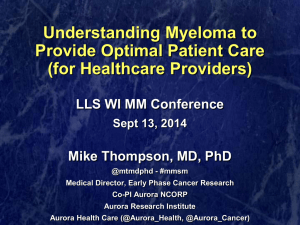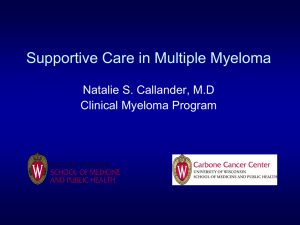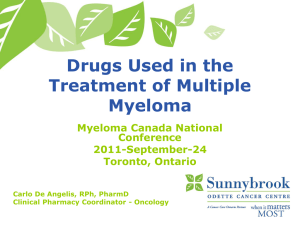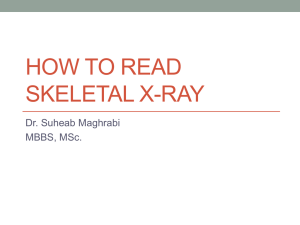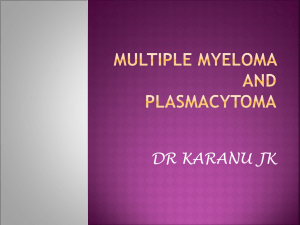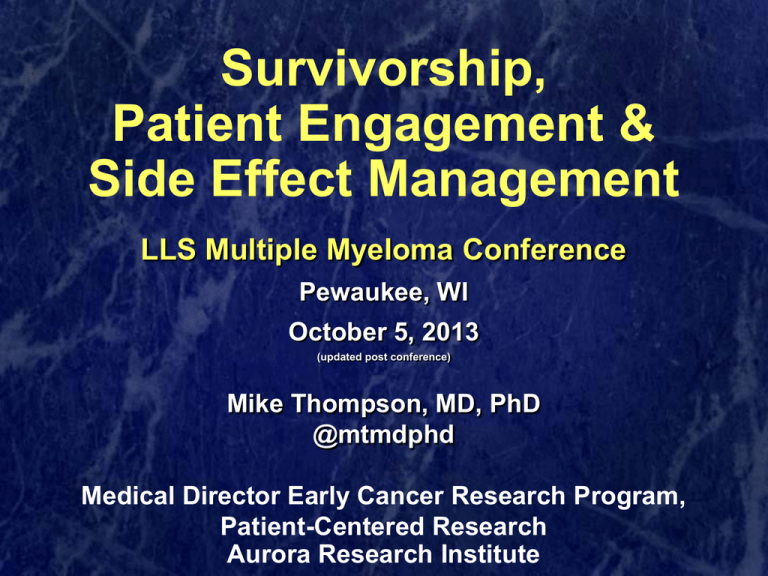
Survivorship,
Patient Engagement &
Side Effect Management
LLS Multiple Myeloma Conference
Pewaukee, WI
October 5, 2013
(updated post conference)
Mike Thompson, MD, PhD
@mtmdphd
Medical Director Early Cancer Research Program,
Patient-Centered Research
Aurora Research Institute
Outline
• COI / Participatory Medicine
• Resources
• #MMSM Twitter Chat
• What is a “Survivor”
• Side Effects & Management
Outline
• COI / Participatory Medicine
• Resources
• #MMSM Twitter Chat
• What is a “Survivor”
• Side Effects & Management
Potential Conflicts
(or Convergence) of Interests:
•
•
•
•
•
•
•
Novartis – research funding (2006, Zometa)
Celgene - MDS registry advisor (2012-)
Seattle Genetics, Advisory Board (2013)
ECOG Myeloma Core Committee
NCI Myeloma Steering Committee
ASCO Cancer Research Committee (2013-16)
Aurora Health Care / ARI
I WILL talk about off label use of
products.
Patient Advocacy / Participatory
Medicine and e-Health
•
•
•
•
•
•
•
•
LLS
Stillwaters Cancer Support Group
International Cancer Advocacy Network (ICAN)
Best Doctors
HealthTap
Doximity
ASCO Connection blogger
#MMSM Twitter Chat
Outline
• COI / Participatory Medicine
• Resources
• #MMSM Twitter Chat
• What is a “Survivor”
• Side Effects & Management
“The Internet”
Is the Internet Really Making Me Stupid,
Crazy, and Constantly Distracted?
http://lifehacker.com/5927763/is-the-internet-really-making-me-stupid-crazy-and-constantlydistracted?utm_campaign=socialflow_lifehacker_twitter&utm_source=lifehacker_twitter&utm_medium=socialflow
Resources
• LLS – www.lls.org
• http://www.canceradvocacy.org/toolbox/multiple-myeloma/
• http://www.mayoclinic.org/multiple-myeloma/symptoms.html
• Multiple Myeloma Personal Care Assistant™
• International Myeloma Foundation
• www.myeloma.org
• ASCO
• http://www.cancer.net/patient/Cancer+Types/Multiple+Myeloma
• Side Effects
•
http://www.cancer.net/patient/Cancer+Types/Multiple+Myeloma?section
Title=Side%20Effects
Cancer.Net
• #mmsm – engaged patients
• MPatient - http://www.mpatient.org/
National Coalition for Cancer
Survivorship (NCCS)
• http://www.canceradvocacy.org/toolbox/multiple
-myeloma/
• Cancer Survival Toolbox
• Side Effects And Symptom Management
Outline
• COI / Participatory Medicine
• Resources
• #MMSM Twitter Chat
• What is a “Survivor”
• Side Effects & Management
Myeloma #MMSM Twitter Chat
• Sunday nights, 9-10 pm
• Search / follow #mmsm
(multiple myeloma social media)
• http://twubs.com/mmsm
• Started 9/15/13 by @mtmdphd &
@myelomateacher
• Next 10/20/13
• Participants from Mayo, MDACC, UNC, etc
Outline
• COI / Participatory Medicine
• Resources
• #MMSM Twitter Chat
• What is a “Survivor”
• Side Effects & Management
What is a Survivor?
Survivorship Definitions
Various
• 5 yrs after Tx / cure
• "From the time of cancer diagnosis,
through the balance of his or her
life."
• National Coalition of Cancer Survivorship
& The Office of Cancer Survivorship (NCI)
& Lance Armstrong Foundation
Many Cancer Survivors
AACR
In the US alone, there are 12 million cancer
survivors
http://ow.ly/6BXgg #AACR #cancerprogress
AACR @AACR2 Oct
In 1971, one of every 69 people was a cancer
survivor. Today, it's one in 23.
http://ow.ly/poyUS #CancerProgress13
The “C” Word
• ASH 2009
• Bart Barlogie used the word “Cure” in
talking about MM
• Ken Anderson (DFCI) & Vincent Rajkumar
(Mayo) followed his talk and didn’t
disagree
• Prior we usually talked about MM as an
incurable disease
• A paradigm shift?
• “Not currently curable” – James Bond (Pt)
2012 WI LLS mtg
“Curability of Multiple Myeloma”
ASH 2009
Delasalle et al. #3864 (MDACC study)
• Conclusions: Assuming that
prolonged CR for more than 10 years
translates into potential cure, we
calculated a "cure fraction" of 2% for
patients treated between 1987-1997.
• Such favorable outcome with
potential cure should be more likely
with current programs associated
with more frequent early intensive
therapy and CR.
MM Curability?
(or chronic disease)
• Kathy Giusti
• Founder and CEO of the MM Research
Foundation (MMRF)
• 15 year multiple myeloma patient (2011)
http://www.themmrf.org/about-the-mmrf/powerful-news/press-releases/kathy-giusti-and-mmrf-featuredin-harvard-business-review.html
Mayo MM Survival
MM Survivors
• Survival/Prognostic tables based on “old”
data.
• We are not curing everyone (yet), but…
• New drugs & treatment approaches are
changing MM.
• MM “Survivors” will increase in number and
need/demand new treatments and supportive
care
“I Will Survive”
Outline
Side Effects
•
•
•
•
•
•
•
•
•
•
•
Steroid SE
Bone
Infection
Fatigue
Sexual
Neuropathy
Financial toxicity
Digestive / GI
Cardiovascular
Renal
2nd malignancies
Side Effects
•
•
•
•
•
•
•
•
•
•
•
Steroid SE
Bone
Infection
Fatigue
Sexual
Neuropathy
Financial toxicity
Digestive / GI
Cardiovascular
Renal
2nd malignancies
Steroid S/E
(Steroids = backbone of MM Tx)
• Mental
• “chemo brain”
• irritability
• mood swings
• depression
• Insomnia
• General
• weight gain
• increased appetite
• general body swelling
• flushing, and sweating
• muscle cramping
• GI - heartburn, gas, and taste changes
• changes in sexual function
• and a “letdown” effect when steroids are stopped suddenly
• paradoxical fatigue
Diabetes Mellitus
• Avoid (relatively) the following:
• Dex
• Thal/Dex
• Len/Dex
• Bortezomib/Dex
• Bortezomib - hypoglycemia
Sleep-shopping
(or "Oops, I purchased what???")
Once per week, I take 20 mg of dexamethasone, which
is a steroid. As a result, I won't sleep at all if I don't take
Ambien twice a week-- on the day I take dex and the day
after. When I take Ambien, I mostly don't remember
what I've done. Which means texting and phone calls
can be comical.
But last week, I encountered something potentially not
comical. After an Ambien night, I woke up the next day,
checked my email, and discovered that I went shopping
in the middle of the night and bought things that I
didn't want or need. I mean, they're kind of cool, but it
was a big "I did what?" moment. So my shipments have
arrived and here's what I ended up with:
7/25/13 - http://lizzysmilez.blogspot.com/2013/07/night-shopping-or-oops-i-purchased-what.html
Outline
Side Effects
•
•
•
•
•
•
•
•
•
•
•
Steroid SE
Bone
Infection
Fatigue
Sexual
Neuropathy
Financial toxicity
Digestive / GI
Cardiovascular
Renal
2nd malignancies
Bone Disease
• 80% MM Pts with “bone disease” –
depends on how you look
• A major source of
• pain
• complications
• death
Bone
• Low bone mass – osteopenia or
osteoporosis
• Lytic bone lesions
• Pain
• Pathologic fractures
• ONJ – osteonecrosis of the jaw from
bisphosphonate (or d-mab) Rx
Bone - Zoledronic Acid in MM
UK MRC Myeloma IX Data
• N = ~ 2000 MM Pts
• Zoledronic acid (Zometa) IV vs.
oral (and less potent) cladronate (not avail in US)
• RESULTS – Favored Zometa
• 50% fewer SRE
• Improved OS 16% (incr med OS by 5.5 mon)
• Increase PFS 12% (incr med PFS by 2.0 mon)
Lancet Oncology (2011;12:743-751)
Lancet 2010;376:1989-99
Bone - Zoledronic Acid in MM
UK MRC Myeloma IX Data
• “Previously people with no bone lesions weren't considered
for treatment with these agents, but I think we have shown
convincingly that you can reduce the rates of SREs in
patients even in patients who don't have bone disease at
baseline,” Dr. Morgan said.
• “That's important, because if patients start out without bone
lesions they don't get bone pain, but once they do have an
SRE there is a chance it will impair their quality of life.”
Lancet Oncology (2011;12:743-751)
Lancet 2010;376:1989-99
Oncology Times: 10 September 2011 - Volume 33 - Issue 17 - pp 13,16
NCCN Updates
Version 1.2012
Adjunctive treatment: The panel now
recommends bisphosphonate therapy
for all patients receiving primary
myeloma therapy. Previously it was
recommended in all myeloma patients
with documented bone disease. For
treatment of hypercalcemia, if
bisphosphonates is chosen, the panel
prefers using zoledronic acid.
NCCN v 2.013
• Zoledronic acid (category 1 EBM)
• SMM
• consider Zometa in clinical trial
• Yearly bone XR survey
• Monitor renal fn & ONJ
• Trial – Zometa vs. denosumab
(NCT01345019)
Bone
• OsteoCLASTs - bone-destroying cells
• OsteoBLASTs - bone-forming cells
• Treatments for bone disease include:
• Drugs
• Radiation
• Vertebro- or kyphoplasty
• Surgery (less common now)
Bone
• Bisphosphonates
• inhibit the activity and formation of bone-destroying cells.
• pamidronate (Aredia) - less effective
• zoledronic acid (Zometa)
• RANK Ligand Inhibitor
• Xgeva (denosumab, Amgen)
• Bortezomib (Velcade)
• Transient rather than permanent new bone formation
• Parathyroid hormone (PTH, teriparatide, Forteo, Lilly) – a drug used to
treat some patients with osteoporosis has a benefit in mice and may be
safe for patients with myeloma
• New drugs – Not approved
• DKK-1 inhibitors
• BHQ880 (Novartis) - antibody
• Activin A inhibitor
• ACE-011 (Sotatercept, Acceleron/Celgene) [& anemia Tx?]
• bone morphogenetic protein receptor type 1A (BMPR1A) inhibitor
• ACE-661 (Acceleron)
Side Effects
•
•
•
•
•
•
•
•
•
•
•
Steroid SE
Bone
Infection
Fatigue
Sexual
Neuropathy
Financial toxicity
Digestive / GI
Cardiovascular
Renal
2nd malignancies
Infection
• MM results (usually) in the expansion
in one (mono-) type “clone” (-clone) =
monoclonal (M-spike) of Ig
• Other Ig’s can be reduced
• Tx can reduce immunity
• Most common cause of MM death is
infection
Infection
• IVIg considered
• Vax – PVX, Influenza
• lower Ab response, but still advised
• Px for high dose Dex
• PCP, herpes, antifungal
• Px for bortezomib (or MM in general)
• Herpes zoster px
Side Effects
•
•
•
•
•
•
•
•
•
•
•
Steroid SE
Bone
Infection
Fatigue
Sexual
Neuropathy
Financial toxicity
Digestive / GI
Cardiovascular
Renal
2nd malignancies
Fatigue
• “The most common symptom of multiple
myeloma is fatigue, found in 70 percent of
patients at diagnosis.” – Mayo
• http://www.mayoclinic.org/multiple-myeloma/symptoms.html (?)
• Anemia – consider Epo (VTE risk), RBC Tx
• Poor sleep
• Decr caffeine
• Good sleep hygiene
• Pain control
• Exercise
Outline
Side Effects
•
•
•
•
•
•
•
•
•
•
•
Steroid SE
Bone
Infection
Fatigue
Sexual
Neuropathy
Financial toxicity
Digestive / GI
Cardiovascular
Renal
2nd malignancies
Sexual Side Effects
• Danish researchers recently found that patients who
underwent SCT frequently experienced sexual
dysfunction, sometimes for extended periods of time
after transplantation.
• Reduced sexual function -> lower quality of life (QOL)
• Decreases in:
• sexual activity (38%)
• ability to have sex (36%)
• pleasure from sex (31%)
• interest in sex (28%)
Thygesen et al. The impact of hematopoietic stem cell transplantation on sexuality: a systematic review of the
literature. Bone Marrow Transplantation , (29 August 2011)
Myeloma Beacon - http://www.myelomabeacon.com/news/2011/09/19/researchers-find-high-rates-ofsexual-dysfunction-after-stem-cell-transplantation/
Outline
Side Effects
•
•
•
•
•
•
•
•
•
•
•
Steroid SE
Bone
Infection
Fatigue
Sexual
Neuropathy
Financial toxicity
Digestive / GI
Cardiovascular
Renal
2nd malignancies
Neuropathy
• Tingling and pain in the hands, arms, feet, and legs
(known as peripheral neuropathy, PN).
• Treatments for myeloma can make this neuropathy
worse
• Combinations of drugs associated with PN can greatly
increase the risk (VTD).
• However, other combinations may decrease the risk of
PN (Hsp90 or HDACi)
Neuropathy
• MM (before Tx)
• Tx related
• Thalidomide
• Much less with other IMiDs
• Bortezomib
• Less with SQ or qWK dosing
• not used much now
• Vincristine
• Platinums
Neuropathy
Mechanism (Thalidomide)
Thalidomide
• Researchers looked at MM pts (n=27 MM & 30 ctrls)
treated with thalidomide
• clinical and electrophysiological assessment of
peripheral sensory nerves
• axonal and demyelinating abnormalities
• Clinically:
• arm and heat-pain detection thresholds were
•
elevated
threshold for skin cooling was decreased
Bilińska M et al. Pol Merkur Lekarski. 2011 Aug;31(182):86-91.
Neuropathy
Bortezomib Dosing
• FDA approved
• 1.3 mg/m2 IV d1,8,11 q21d
• PN 36% total ; Gr 3 7%, Gr 4 <1%
• Weekly
• 1.6 mg/m2 IV weekly
• REF: Greco et al. ASCO 2006 #7547
• N=37 (26 evaluated)
• PN 0%
• Subcutaneous (SQ)
• 1.3 mg/m2 SQ d1,4,8,11 q21
• REF: Moreau et al. Lancet Oncol 12(5):431-440
• N=222 (145 SQ, 77 IV) ; 3 RCT
• PN: SQ 38% vs. IV 53% (total)
• PN >=gr3 – SQ 57% vs. IV 70%
NOTE: No data for SQ qWEEK. SQ may be good for home. Weekly decr PN
Neuropathy
• 2011 -- No randomized controlled trials (RCTs) published of any
drug or supplement in myeloma patients looking to prevent or treat
peripheral neuropathy
• Vitamin B6 and nutritional supplements with amino acids, pain
medicines,
• anti-depressants, NSAIDs (watch kidneys!)
• Neuropathy meds – anti-seizure drugs
• Duloxetine (Cymbalta) ?
Effect of Duloxetine on Pain, Function, & Quality of
Life Among Patients with Chemotherapy-Induced
Painful Peripheral Neuropathy:
A Randomized Clinical Trial
• Ellen M. Lavoie Smith, PhD et al. JAMA. 2013;309(13):1359-1367.
• Importance There are no known effective treatments for painful chemotherapy-induced
peripheral neuropathy.
• Objective To determine the effect of duloxetine, 60 mg daily, on average pain severity.
• Design, Setting, and Patients Randomized, double-blind, placebo-controlled crossover
trial at 8 National Cancer Institute (NCI)–funded cooperative research networks that
enrolled 231 patients who were 25 years or older being treated at community and
academic settings between April 2008 and March 2011. Study follow-up was completed
July 2012. Stratified by chemotherapeutic drug and comorbid pain risk, patients were
randomized to receive either duloxetine followed by placebo or placebo followed by
duloxetine. Eligibility required that patients have grade 1 or higher sensory neuropathy
according to the NCI Common Terminology Criteria for Adverse Events and at least 4 on
a scale of 0 to 10, representing average chemotherapy-induced pain, after paclitaxel,
other taxane, or oxaliplatin treatment.
• Interventions The initial treatment consisted of taking 1 capsule daily of either 30 mg of
duloxetine or placebo for the first week and 2 capsules of either 30 mg of duloxetine or
placebo daily for 4 additional weeks.
http://jama.jamanetwork.com/article.aspx?articleid=1674238
• Main Outcome Measures
• The primary hypothesis was that duloxetine would be more effective
than placebo in decreasing chemotherapy-induced peripheral
neuropathic pain. Pain severity was assessed using the Brief Pain
Inventory-Short Form “average pain” item with 0 representing no pain
and 10 representing as bad as can be imagined.
• Results
• Individuals receiving duloxetine as their initial 5-week treatment reported
a mean decrease in average pain of 1.06 (95% CI, 0.72-1.40) vs 0.34
(95% CI, 0.01-0.66) among those who received placebo (P = .003;
effect size, 0.513).
• The observed mean difference in the average pain score between
duloxetine and placebo was 0.73 (95% CI, 0.26-1.20).
• Fifty-nine percent of those initially receiving duloxetine vs 38% of those
initially receiving placebo reported decreased pain of any amount.
• Conclusion and Relevance
• Among patients with painful chemotherapy-induced peripheral
neuropathy, the use of duloxetine compared with placebo for 5 weeks
resulted in a greater reduction in pain.
• Trial Registration clinicaltrials.gov Identifier: NCT00489411
Neuropathy Treatments
Not proven
http://www.myelomabeacon.com/forum/preventing-peripheral-neuropathy-t24.html
Dr. Paul Richardson from the Dana-Farber Cancer Institute said:
"Please see below for some suggestions - please note that dose reduction and
schedule change are key to minimizing PN; supplements should not be taken on the
same day of Velcade (bortezomib) administration as there are reports of antagonism
pre-clinically (ie in the lab), although this has not been shown in patients.
All supplements must be discussed with and approved by the treating physicians
concerned. Supplements should be taken with food unless otherwise indicated.
MULTI-B COMPLEX VITAMINS
with B1, B6, B12, folic acid and other
B6 should be approximately 50mg daily,not to exceed 100mg per day
Folic acid should be 1mg per day
VITAMIN E
400 IU daily
VITAMIN D
400-800 IU daily
Neuropathy Treatments
(cont)
FISH OILS
OMEGA-3 FATTY ACIDS (EPA and DHA)
MAGNESIUM
Suggested doses include: 250mg twice a day (OTC)
Alternatively 400mg daily by prescription with dose frequency dependent on serum
magnesium levels
May cause diarrhea in larger doses
POTASSIUM
Either as provided by the treating physician or foods that are rich in potassium (e.g. bananas,
oranges and potato).
TONIC WATER (Seltzer water)
Drink one glass in evening and any other time cramping occurs
ACETYL L- CARNITINE
500mg twice a day with food
Can take up to 2000mg a day.
ALPHA-LIPOIC ACID
300mg to 1000mg a day with food
Glutamine
1g up to three times a day with food"
Neuropathy
Other potential Therapies
• Massage
• Accupuncture
• reTouch is the first medical device designed to restore
sensation to those suffering with peripheral neuropathy.
https://www.facebook.com/retouchneuropathy
• Spinal Cord Stimulators ?
•
http://professional.medtronic.com/mri/surescan-mri-radiologists/scs/surescansystem/index.htm#.Ui44b9IpIYU
• ASCO – Cancer.Net – Managing Peripheral Neuropathy
•
http://www.cancer.net/patient/All+About+Cancer/Cancer.Net+Feature+Articles/Side+Effects/Managing+Periph
eral+Neuropathy
Outline
Side Effects
•
•
•
•
•
•
•
•
•
•
•
Steroid SE
Bone
Infection
Fatigue
Sexual
Neuropathy
Financial toxicity
Digestive / GI
Cardiovascular
Renal
2nd malignancies
Financial toxicity
• Household finances
• Health Insurance
• Applying for insurance or filing claims can be
•
•
a full time job
Financial counselors at your physicians
office
LLS
• WI: Cancer Treatment Fairness Act
http://capwiz.com/myeloma/issues/alert/?alertid=62393536
• Rights in the workplace
• ACA – coverage for most
Financial toxicity
Financial Aid
• The Leukemia & Lymphoma Society's (LLS's) Patient Financial
Aid Program provides a limited amount of financial assistance to
help patients who have significant financial need and are under a
doctor's care for a confirmed blood cancer diagnosis.
• LLS's Co-Pay Assistance Program offers financial support
toward the cost of insurance co-payments and/or insurance
premium costs for prescription drugs. Patients must qualify both
medically and financially for this program.
• Information and resources regarding insurance, managed care
and employment issues are provided
in Insurance and Employment.
• 1-800-955-4572
• http://www.lls.org/#/diseaseinformation/getinformationsupport/financialmatters/
Outline
Side Effects
•
•
•
•
•
•
•
•
•
•
•
Steroid SE
Bone
Infection
Fatigue
Sexual
Neuropathy
Financial toxicity
Digestive / GI
Cardiovascular
Renal
2nd malignancies
Digestive / GI
• Constipation
• Pain meds
• Drugs (bortezomib)
• Hypercalcemia
• Diarrhea
• Nausea / Vomiting
Outline
Side Effects
•
•
•
•
•
•
•
•
•
•
Steroid SE
Bone
Infection
Fatigue
Sexual
Neuropathy
Financial toxicity
Cardiovascular
Renal
2nd malignancies
Cardiovascular
& VTE
NCCN Guidelines v.1.2012
• Heart SE – decreased ejection fraction
• Anthracyclines
• Adriamycine
• Doxil – liposomal anthracycline
• VTE – PE or DVT
• Associated with Thal, Len/Dex
• Px A/C rec (NCCN v1.2012) if above meds
• Px
• ASA – usually not effective for VTE, but some
benefit in MM
• Warfarin
• LMWH
Pt with thrombosis risk
• Avoid the following:
• thalidomide
• bevacizumab (eg, Bev/Rev/Dex)
• Above + Epo
Outline
Side Effects
•
•
•
•
•
•
•
•
•
•
•
Steroid SE
Bone
Infection
Fatigue
Sexual
Neuropathy
Financial toxicity
Digestive / GI
Cardiovascular
Renal
2nd malignancies
Renal Failure in Myeloma
• Mechanism
• Light chain cast deposition – tubule
•
•
•
•
•
obstruction (“myeloma kidney”)
Obstruction by a plasmacytoma
Hypercalcemia, hyperuricemia
Renal amyloid
Recurrent pyelonephritis
May develop RTA2 (Fanconi syndrome)
• Prevention
• Avoid NSAIDs, contrast
• High urinary output (3L/d)
Renal Dysfunction
NCCN Guidelines v.2.2013
•
•
•
•
•
•
Maintain hydration to avoid renal failure
Avoid use of NSAIDs
Avoid IV contrast
Plasmapharesis (category 2B)
Not a contraindication to transplant
Monitor for renal dysfunction with chronic
use of bisphosphonates
Renal Failure Treatment
Bortezomib
•
•
•
•
Subset analysis of SUMMIT & CREST
S/E – similar in normal vs decr CrCL
Crt level not affected
Response
CrCL (mL/min)
n
ORR (%)
>80
105
45
51-80
99
33
<= 50
52
25
< 30
10
30
Jagannath et al. Cancer 2005;103:1195-1200
Renal Failure Treatment
• Bortezomib
• FDA approved in renal insuff/failure
• VD
• VTD
• VAD – Vincristine/Adriamycin/Dex
• thalidomide
• lenalidomide possible – PrECOG PrE1003
study P I/II ongoing
Renal Recovery
Reversibility of Renal Failure in Newly Diagnosed Patients with
Multiple Myeloma and the Role of Novel Agents
• group A: n=28 conventional chemo (CC) + Dexa-based regimens
(VAD, VAD-like regimens, melphalan plus Dexa);
• group B: n=38 - IMiDs-based regimens (thalidomide or
lenalidomide with high dose Dexa and/or CTX or melphalan)
• group C: n=16 - bortezomib-based regimens with Dexa
• A/B/C – Renal CR: 43% / 50% / 69% (p=0.2)
• A/B/C - RCR+RPR: 50% / 57% / 81% (p=0.1)
Roussou et al. ASH 2009 Abstr#955
Renal Recovery
• In multivariate analysis bortezomib–based regimens (p=0.02, OR:
7, 95% CI 1.5-25) and CrCl>30 ml/min (p=0.002, OR: 6.1, 95% CI 2.522.5) were independently associated with a higher probability of
RCR+RPR
• Novel agent-based regimens can improve renal function in most
patients; furthermore bortezomib-based regimens improve renal
function to a higher degree and significantly more rapidly than CC
plus Dexa-based or IMiD-based regimens even in patients with
severe renal impairment.
• We conclude that bortezomib-based regimens may be the
preferred treatment for newly diagnosed myeloma patients who
present with renal impairment.
Roussou et al. ASH 2009 Abstr#955
Orlowski tweet
MD Anderson trial for relapsed/refractory
#myeloma patients with renal failure:
#Pomalidomide/Dex: 1.usa.gov/UZuvW6.
1-855-MYELOMA.
Outline
Side Effects
•
•
•
•
•
•
•
•
•
•
•
Steroid SE
Bone
Infection
Fatigue
Sexual
Neuropathy
Financial toxicity
Digestive / GI
Cardiovascular
Renal
2nd malignancies
2nd Malignancies in MM
http://www.ascopost.com/articles/august-15-2011/second-primary-malignancies-explored-in-multiplemyeloma.aspx
• http://www.ascopost.com/articles/august-15-2011/second-primarymalignancies-explored-in-multiple-myeloma.aspx
• Three randomized controlled trials presented at the 2010 Annual
Meeting of the American Society of Hematology (ASH) suggested that
treating multiple myeloma with lenalidomide (Revlimid) increased the
risk of second primary malignancies; of particular concern is
transformation to acute myeloid leukemia or myelodysplastic syndromes
• Celgene letter p. 3 SPM Summary
MDS – Mechanism?
Epo Gene
Polymorphism of the erythropoietin gene promotor and the development of
myelodysplastic syndromes subsequent to multiple myeloma
O Landgren, W Ma, R A Kyle, S V Rajkumar, N Korde and M Albitar
Leukemia , (16 September 2011)
oi:10.1038/leu.2011.262
*Abstract*
The occurrence of acute myeloid leukemia (AML) and myelodysplastic syndromes (MDSs) following multiple myeloma has been
recognized for decades.1
Alkylating agents have long been considered to be part of the cause.2, 3, 4, 5
Some, but not all, smaller investigations have reported that higher cumulative melphalan dose and longer duration of melphalan
therapy are associated with an increased risk of AML.6, 7
The role of nontreatment-related factors is largely unknown.
•
Previous studies (Ma et al BMC Med Genet 2010) showed the association with the the erythropoietin (EPO) promoter
single nucleotide polymorphism (SNP) G/G for rs1617640 in MDS.
•
•
•
This small (n=32 evaluable total) nested case-control study showed:
•
•
These are small numbers, but agree with non-myeloma specific patient risk of MDS.
•
This could be a very important "survivorship-omics" issue for MM treatment.
MM -> MDS - 4/15 (27%)
MM -> no MDS - 2/15 (12%)
While this study needs to be validated in larger sample sets, it will be interesting to see if it holds up and perhaps more
importantly the genotype can suggest which type of chemotherapy agents an individual patient could receive to
decrease the risk of MDS.
SPM may not be MM specific…
CLL
Second cancer incidence and cancer mortality among chronic lymphocytic leukaemia
patients: a population-based study.
Background:
Patients with chronic lymphocytic leukaemia (CLL) are known to have increased risks of second cancer.
The incidence of second cancers after CLL has not been reported in detail for Australia, a country with particularly high
levels of ultraviolet radiation (UVR).
Methods:
The study cohort comprised of all people diagnosed with a primary CLL between 1983 and 2005 in Australia. Standardised
incidence ratios (SIRs) and standardised mortality ratios (SMRs) were calculated using Australian population rates.
Results:
Overall, the risk of any second incident cancer was more than double that of the general population (SIR=2.17,
95% confidence interval (CI)=2.07, 2.27) and remained elevated for at least 9 years after CLL.
Risks were increased for many cancers, particularly melanoma (SIR=7.74, 95% CI=6.85, 8.72).
The risk of melanoma increased at younger ages, but was constant across >9 years of follow-up.
CLL patients also had an increased risk of death because of melanoma (SMR=4.79, 95% CI=3.83, 5.90) and nonmelanoma skin cancer (NMSC; SMR=17.0, 95% CI=14.4, 19.8), suggesting that these skin cancers may be more
aggressive in CLL patients.
Conclusion:
We speculate that a shared risk factor, such as general immune suppression, modulated by UVR exposure may explain the
increased risk of melanoma and NMSC in CLL patients.
Royle et al. Br J CA 105, 1076-1081 (27 September 2011)
Conclusions
• More Treatments
• Improved Survival
• More survivors
• Online, LLS resources
• #MMSM Twitter Chat – Sun 10/20 9-10pm
• WI has great myeloma people
Contact Info
• Aurora: 414-219-4763
• Twitter: @mtmdphd
SPM
BiRD regimen, Single Institution
• Incidence of second primary malignancies (SPM) after 6-years followup of continuous lenalidomide in first-line treatment of multiple
myeloma (MM). Rossi et al ASCO 2011 #8008. Abbreviated...
Background:
•
•
•
Clarithromycin (Biaxin), lenalidomide and dexamethasone (BiRD)
N=72
OR: 90.3%, 38.9% (sCR/CR), 73.6% VGPR
Results:
•
•
•
•
•
68 evaluable pts
SPM: 11 new diagnoses (incidence of 16%) after an average of 31 cycles (range 3-68) of lenalidomide (BiRd).
SPM: 6/11 skin cancers (4 BCC, 2 SCC); 2 colon, 1 prostate, 1 pancreas and 1 metastatic melanoma.
0 MDS/AML.
Mean time to SPM diagnosis was 35 months (range 5-64).
Conclusions:
No cases of secondary MDS/AML were seen, in contrast to reports in relapse/refractory pts who received Rev as
third or fourth line therapy (Reece, Goswami ) or as post-transplant maintenance (Attal , McCarthy).
Frequency of SPM is similar to 2010 SEER data for non-MM individuals of similar age.
As survival in pts with MM continues to improve, so will our understanding of the long-term effects of novel agents.
Design of regular cancer screening programs (derm and GI) of MM pts should be regularly implemented.
MM Background
Clinical Features
• Early MM – often asymptomatic
• Common clinical features:
• C – hyper-Calcemia
• R – renal (kidney) problems
• A – anemia
• B – bone pain
• Fatigue
• Recurrent infections
• Neuropathy
MM Epidemiology
• Incidence: 4-5/100,000
• 2010 est. cases: >20,000
• 2008 est. cases: 19,9201 ,deaths: 10,6901
• Median age at dx: 702,3
• 7% before age 55
• 2% before age 40
• 0.3% before age 30
1. Jemal A, et al. Cancer Statistics, 2008. CA Cancer J Clin 2008;58:71-96
2. Ries LAG, et al. SEER Cancer Statistics Review, 1975-2004. National Cancer Institute. Bethesda, MD:
Available at http://seer.cancer.gov/csr/1975_2004. Accessed April 10, 2008.
3. Attal et al, NEJM 1996, IMF90
Historical MM Tx
• 1960’s
• Melphalan
• Glucocorticoids (steroids)
• 1970’s-1980’s
• Combo chemo – VAD
• High dose chemo
• Stem cell transplant (SCT)
Historical MM Tx
• 1990’s
• bisphosphonates
• 2000-Present – new drugs!
• thalidomide
• bortezomib
• lenalidomide
• bortezomib/Doxil (liposomal
adriamycin) (rel/ref)
• Others…
LinkedIn Forum (LLS) 2011
“Multiple Myeloma
Survivorship Issues?”
http://www.linkedin.com/groupItem?view=&gid=39708&type=member&item=60250765&
qid=7421bb82-2a51-41a5-a594-d8ae47c7c67a&goback=%2Egmp_39708
- CIPN – chemo-induced peripheral neuropathy
- Steroid side effects –
- bone loss
- insomnia/mania
- paradoxical fatigue
- other psychiatric problems
- hyperglycemia/worsened diabetes,
- swelling
- increased weight

